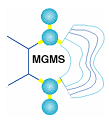Analysis of Cancer Mutations Directed Towards Rational Design of Selective Inhibitors for RTKs
Gorostiola González1,L. Burggraaff1, H.W.T van Vlijmen1,2, A.P. IJzerman1, L.H. Heitman1 and G.J.P. van Westen1
1Division Drug Discovery and Safety, Leiden Academic Centre for Drug Research, Leiden University; Oncode Institute, The Netherlands
2Janssen Research & Development, Belgium
Receptor Tyrosine Kinases (RTKs) are known to be involved in several cancer-related pathways[1]. In fact, many of the FDA-approved targeted cancer therapies act against different members of this family (e.g. EGFR for lung cancer, HER2 for breast cancer)[2]. However, a common drawback of targeting kinases is the lack of selectivity towards the desired kinase, mainly due to the high conservation of their orthosteric binding pocket, increasing the number of side effects[3]. Several approaches have been taken to reduce this effect, including selectively targeting mutant kinases present in cancer patients, this way opening room for personalized oncology medicine[4]. Here, we explore the use of computational tools to identify mutations with promising properties to be selectively targeted in cancer therapies. The pipeline we developed starts with a statistical modelling phase, in which data is gathered from a number of databases (notably Genomic Data Commons[5], ChEMBL[6], KLIFS[7], and PhosphoAtlas[8]), curated, integrated in a complex knowledge network, and analyzed. A ranked list of promising mutations is then produced, from which a few case studies are selected. For those, a structural phase is applied, in which computational structural approaches such as docking, molecular dynamics (MD), and free energy perturbation (FEP), are used to predict a difference in binding affinity between wild type and mutant (i.e. selectivity towards mutant) for a set of small molecules. The results from the statistical analysis show that the pipeline is able to identify known mutants selectively targeted in personalized medicine approaches (e.g. EGFR-L858R, targeted in lung cancer with osimertinib[9]). This is evidence that the integration and analysis of available data is a powerful method to identify mutants to target selectively in cancer. In the future, the validated pipeline will be coupled to rational design of novel selective inhibitors for RTKs as anticancer therapies.
References
[1] Butti, R. et al. Molecular Cancer. 17 (2018).
[2] Yamaoka, T., Kusumoto, S., Ando, K., Ohba, M. & Ohmori, T. International Journal of Molecular Sciences. 19, 1–35 (2018).
[3] Fabbro, D., Cowan-Jacob, S. W. & Moebitz, H. British Journal of Pharmacology. 172, 2675–2700 (2015).
[4] Roskoski, R. Pharmacological Research. 152 (2020).
[5] Grossman, R. L. et al. New England Journal of Medicine. 375, 1109–1112 (2016).
[6] Gaulton, A. et al. Nucleic Acids Research. 40, 1100–1107 (2012).
[7] Van Linden, O. P. J., Kooistra, A. J., Leurs, R., De Esch, I. J. P. & De Graaf, C. Journal of Medicinal Chemistry. 57, 249–277 (2013).
[8] Olow, A. et al. Cancer Research. 76, 1733–1745 (2016).
[9] Soria, J. C. et al. New England Journal of Medicine. 378, 113–125 (2018).


